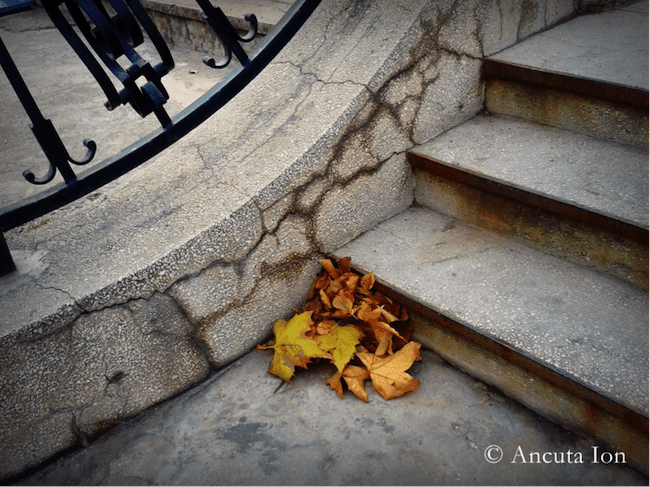Your buttocks are cold and aching because youve been pressing them for too long against those filthy concrete steps on the hallway, in front of the elevator. There are cigarette stumps and ashes all over the place, but that does not bother you in the least. Youre happy that human transit is sparse on the 4th floor, though you hear the elevator set in motion every now and then. It doesnt make much sense, since its Saturday night, but nothing seems to make any sense lately, so youre okay with that. Breathe in, breathe out. Its all good.
Except its not. Actually, its just the perfect time for another bout of closeted weeping and self-loathing. Besides, youre seething with anger and you wish you could have broken at least three or four of those countless glass jars that have been piling up in your kitchen throughout time. That, however, cant happen as easily as you snap your fingers, especially since you dont have the wherewithal to fulfill whatever might bring you a tad of alleviation. Your main flaw could be the fact that maybe youre a little bit too considerate. You know your roommate would suspect theres something wrong if she saw you leave the room with a book in one hand, a couple of glass jars in the other one and, on top of that, a broom and a dustpan under your arm. You have to suck it up it is morally and socially unacceptable for you to let off some steam, which youll have to repress some more since you dont have the guts or the energy to get dressed.
But you cannot spend another second in this smothering room, with this being whose breathing sounds and giggles are driving you crazy and who always complains about volume of your music. So, youre leaving the room with the book in your hand and your key in your pocket.
Its a good thing youre all alone right now, but maybe youre not that alone after all. Your thoughts chaperon you wherever you go and you cant just simply block them out of your mind. There arent any other concrete steps within your reach, so this is the closest thing to a haven you could get youd better make the most of it. Youre tremendously lucky to have gotten rid of those blood pressure-elevating breathing sounds and giggles.
After the bout of weeping and self-loathing is seemingly over, you somehow manage to find the strength to open that book you took with you when you left the room The Noonday Demon: An Atlas of Depression by Andrew Solomon. Youve been ingesting the first 200 pages with bated breath and you cant wait to proceed with your reading. Theres this special chapter dedicated to depression in relation with certain geographical areas and population groups and now youve reached the part where the main focus is on Greenland. Thats when you start caving in again to your own depression, because you remember how much you wish you could travel to Greenland someday and how remote from reality that actually is.
You are stuck in mediocrity, yet somehow, youre allergic to the word thrive.” You also feel nauseous whenever you hear words such as leadership,” soft skills or personal development.” A friend keeps telling you that she didnt expect you to be so weak that you cant snap out of the claws of depression. You keep telling her that depression is a disease different from the common cold, which generally goes away on its own in a week, but you cant get through to her. Although she insists that she also fights depression time and again, shes lived a life of serendipity and self-indulgence that has barred her capacity to relate to truly depressed peoples struggles. I keep telling her that grief and depression are not the same thing, though they might overlap up to some point. It is normal for your heart to beat faster when you go for a morning jog or when youre anxiously waiting for your exam results. But when your heart beats ridiculously fast even at rest, with no prior exertion or emotional distress, that might as well indicate that you have heart failure. Does it mean that all people who have heart failure are weak and, therefore, responsible for their condition? Does it mean that depression is some sort of scarlet letter attached to the forehead of the feebleminded?
I keep wondering, in a rather Sisyphean way, why people cannot fathom the immense strength it takes for someone struggling with a depressive breakdown to keep up a good front and to be at least a partially functioning human being. Has any normal person at least by the current standards – ever envisioned what it feels like to repress all those feelings of inadequacy and all that overpowering rage, because you know that no one deserves to be harmed on account of your personal issues? You could have chosen to break those glass jars in the middle of the room or on the hallway, but before proceeding to that, you thought it over and realized that no ones actually guilty for your breakdowns. Thats on you and only you. As a result, you chose to set matters straight with yourself, sitting on some cold concrete steps and forestalling your negative feelings from interacting with the cocoon of normality floating all around you.
See the rest of Ancu?a’s posts here.


